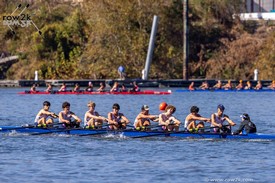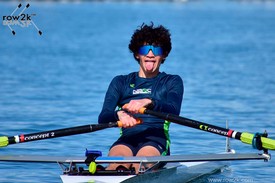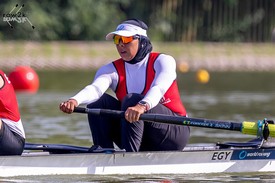I went out this morning for a row in my single; the air was cold and crisp, and the water had that particular low-grade choppiness endemic to fall on the Schuylkill. The racing season is over, for me at least, and to be honest, I am relieved. I left my heartrate monitor, stress, and workout plan behind in the locker room: I resolved to try to reconnect with the water and my boat, and the elemental joy I used to find in the motion. After five months of racing or thinking about racing, my mind and body are weary, and ready for a rest. I had woken up initially with the feeling that I did not want to endure another frustrating hour spent battling boat, current, and wind. However, habit prevailed, and I emerged from my cocoon, groggily sought a pair of clean socks from a pile of laundry, and trundled out the door to start the forty-minute walk to the river. The boathouse was deserted; it felt like the regulars had flown to warmer climes for the winter, like the geese--leaving me to wonder why I did not follow suit. In the signout log I noticed someone else was out in a single, and so I started the daily ritual in earnest.
By this time, the sun was up over the downtown skyline. It edged the water, bridges, and trees along the banks with fire. The colors were almost blinding, certainly distracting, as evidenced by my near-miss with a masters double. The forms of the landscape were so distinct, and color so vibrant, that I felt like I had stumbled onto the set of a movie. As I passed the first set of bridges, my initial trepidation was replaced by elation; a tight feeling high up in my chest that made me pick the rating and the pressure up a little bit; switching the feel of the row from a slouch to a crisp, bouncy clip.
I could see my shadow cast over my sterndeck and my wake--a makeshift alternative to videotaping, and enjoyed watching it for any obvious errors in rhythm or form. I began to relax, and remember why it is that I returned to this sport last fall after six years' absence. I don't know when I lost that joy in being in the moment, but it was crucial to my well-being, both in and out of the boat. That feeling of pleasure is so simple to achieve; the embers are stoked by the singular sound as the oar places itself well in the water; or the comfort taken in prying my bodyweight on the sculls, and knowing the water will hold me; or the ecstatically light feeling on the recovery when the boat is running out nicely. I realized that had not been paying attention to these details. It was as if I had looked so far into the distance that I'd run myself into a bridge abutment.
When I was rowing in high school, I went to Zen meditation because I liked the idea that it taught my mind to pay attention to the present moment, a useful tool during long steady state practices in eights where the urge to tune out can be overwhelming. After I had to leave rowing in college, Buddhism helped me to appreciate where I was in life, rather than spending days or months or years in limbo, waiting for some future, that, as Fitzgerald wrote, will always elude us.
For the last two months, I have ignored being in the present moment; I have focused on a future race, or a future erg score. I was so wrapped up in the heady allure of competition that I'd missed the point; to try to achieve excellence should not be in comparing myself to others, but to see if I can move the boat in the best way possible for my self and circumstances. Perhaps it is not possible to be a competitive rower and a good Buddhist, whatever that means; but I plan to try. I believe there is a way to blend the two in a search for grace. Call it a more healthy way to gain speed, in an obsessive sport that can create an unbalanced view of the world, separated into those who go fast, and those who do not. These distinctions impoverish our experience.
A friend once told me that the only time he had been truly happy in his rowing career was right after he'd won in a National Team trial, and then only for a short time. This is missing the journey; missing the details of everyday life for a promise that will always elude us, for there's always some further goal to be attained, some past wrong to be avenged, some justification of our existence to be gained. Why play the game? The finish line keeps moving, and I don't want to emulate Sisyphus. I have too many other things to do.
I had lost the reason why I started rowing again--which was that I enjoy the process of moving a shell through the water--and had gotten hung up on expectations caused by my summer--both those I placed on myself, and those others around me placed on me. Not very Buddhist, is it? So I resolved to try to be more attentive to my presence in the present, as opposed to wishing for a future that may never come.
In short, to play, and be serious about my playing and playfulness. Rowers often boast of the camaraderie of the sport, and in the same conversation can also display a competitiveness that ultimately can be isolating. Ironic, given that ours is a team sport. We are hardly aware that we do this; and perhaps then we are unaware of a source of unhappiness, when expectations are left unfulfilled, as they probably always will be.
It's an interesting problem, this balancing act.
If you enjoy and rely on row2k, we need your help to be able to keep doing all this. Though row2k sometimes looks like a big, outside-funded operation, it mainly runs on enthusiasm and grit. Help us keep it coming, thank you! Learn more.
- Bont Rowing
- Calm Waters Rowing
- Concept 2
- Craftsbury Sculling
- The Crew Classic
- CrewLAB
- Croker
- Durham Boat Co.
- Empacher
- Faster Masters
- Filippi
- Fluidesign
- h2row.net
- HUDSON
- Live2Row Studios
- Nielsen-Kellerman
- Oak Ridge RA
- Peinert Boat Works
- Pocock Racing Shells
- Race1 USA
- RowKraft
- Rubini Jewelers
- Vespoli USA
- WinTech Racing
- Bont Rowing
- Calm Waters Rowing
- Concept 2
- Craftsbury Sculling
- The Crew Classic
- CrewLAB
- Croker
- Durham Boat Co.
- Empacher
- Faster Masters
- Filippi
- Fluidesign
- h2row.net
- HUDSON
- Live2Row Studios
- Nielsen-Kellerman
- Oak Ridge RA
- Peinert Boat Works
- Pocock Racing Shells
- Race1 USA
- RowKraft
- Rubini Jewelers
- Vespoli USA
- WinTech Racing

















